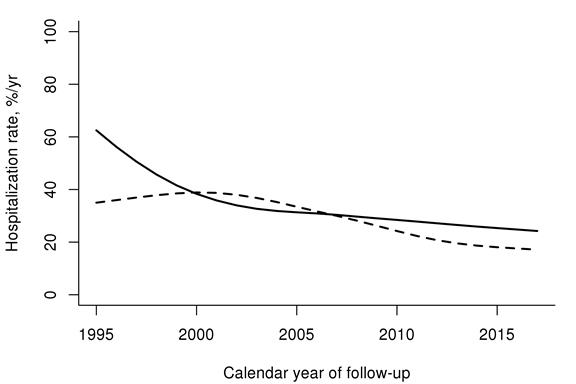Session Information
Session Type: ACR/ARHP Combined Abstract Session
Session Time: 9:00AM-11:00AM
Background/Purpose: The study purpose was to determine whether patients with polymyalgia rheumatica (PMR) are at greater risk for all-cause hospitalizations compared to the general population.
Methods: The study cohorts included all incident cases of PMR in a geographically-defined area diagnosed between 1995 and 2014 and non-PMR subjects from the same underlying population with similar age, sex and calendar year of index. Patients were followed until death, migration, last contact or June 30, 2017. Discharge diagnoses were grouped together using Clinical Classification Software (CCS). Readmission was defined as a hospital admission date within 30 days of a prior discharge date. Person-year methods and rate ratios (RR) from Poisson regression models were used to compare hospitalization rates between the groups. Generalized linear models were used to analyze the length of stay (LOS).
Results: A total of 463 PMR and 459 non-PMR subjects (64% female; mean age 74.1 years for both) were followed for medians of 8.4 and 7.4 years, respectively.
The patients with PMR had 1398 hospitalizations and the non-PMR patients had 1207 hospitalizations. Both groups had similar rates of all-cause hospitalizations [rate ratio (RR) 1.03; 95% confidence interval (CI): 0.95–1.11]. The rate ratio of hospitalizations for PMR compared to non-PMR remained relatively stable over time except for marginally higher rate ratios in the 1995-1999 (RR 1.40; 95% CI: 1.01-1.96) and 2010-2017 (RR 1.17; 95% CI: 1.05-1.31) time period (Figure). The rate of hospitalization remained stable across disease duration. There were no significant differences in hospitalizations according to discharge diagnosis groupings for patients with PMR vs non-PMR. The average length of stay was 4.4 and 4.7 days, respectively, among the PMR and non-PMR hospitalizations (p=0.16). Readmission rates were similar among the PMR subjects with 215 readmissions (20% of 1063 subsequent hospitalizations) compared to the non-PMR subjects with 214 readmissions (24% of 904 subsequent hospitalizations; p=0.07).
Figure. Age and sex adjusted hospitalization rates across calendar year among patients with incidence PMR in Olmsted County (solid line) and age- and sex-matched comparators (dashed line)
Conclusion: In this analysis of all-cause hospitalizations in a population-based cohort, patients with PMR did not have higher hospitalization rates compared to the general population.
To cite this abstract in AMA style:
Raheel S, Crowson CS, Achenbach SJ, Matteson EL. Hospitalization Rates Among Patients with Polymyalgia Rheumatica: A Population-Based Study from 1995-2017 [abstract]. Arthritis Rheumatol. 2018; 70 (suppl 9). https://acrabstracts.org/abstract/hospitalization-rates-among-patients-with-polymyalgia-rheumatica-a-population-based-study-from-1995-2017/. Accessed .« Back to 2018 ACR/ARHP Annual Meeting
ACR Meeting Abstracts - https://acrabstracts.org/abstract/hospitalization-rates-among-patients-with-polymyalgia-rheumatica-a-population-based-study-from-1995-2017/

